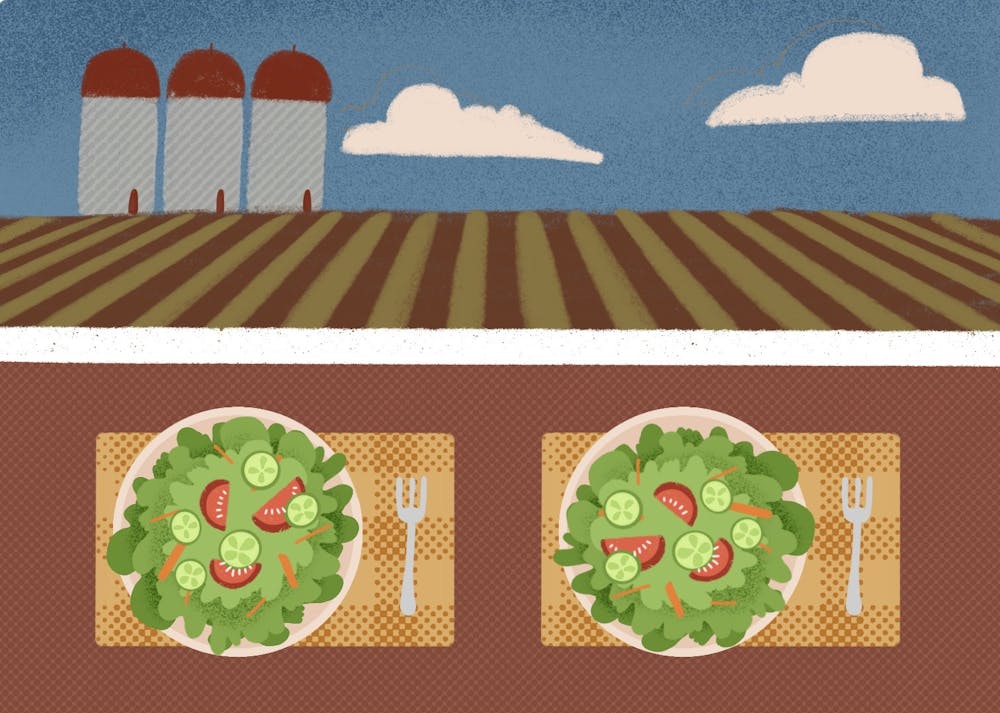Justin Bazdarich, a Michelin-starred chef and former ASU student, has returned to the University with a simple mission: to study sustainability, and then utilize those skills in his new vegan restaurant.
Xilonen, located in Brooklyn, New York, opened in December 2020 and features a sustainable Mexican-style vegan and plant-based menu. In his mission to create a more sustainable restaurant and industry, he came to ASU to study the subject further.
"I heard such great things about the School of Sustainability and the classes that were offered in the department," he said. "I wanted to focus my attention towards plant-based and plant-rich menu items because I want to make a difference in the world by trying to shift the public's attention to the fact they don't have to eat meat every meal."
Bazdarich originally went to ASU in 1995 to study industrial design. During his second sophomore year, Bazdarich left ASU and began working at local restaurants in the area. His first cooking job was at Pita Jungle, just off campus.
He was thrown into the kitchen and although he had never worked in a restaurant before, he had always enjoyed cooking at home. After his time at Pita Jungle, Bazdarich went on to work at Casey Moore’s Oyster House, where he began to learn more about the restaurant industry.
"I understood that (restaurants) had everything I was interested in," Bazdarich said. "I was interested in industrial design, architecture, art and interior design, and all those things come into play with the restaurant industry. That's where I started to realize that this is what I wanted to do."
Bazdarich moved to Texas, then later to New York to go to the French Culinary Institute.
While in Texas, Bazdarich was inspired by a cookbook he had seen from the famous chef, Jean-Georges Vongerichten. While in New York, Bazdarich became an intern at one of Vongerichten's restaurants. He began working as a line cook, gradually moving his way up to sous chef.
After working there for three years, Vongerichten asked Bazdarich to help him open another restaurant in Manhattan, Perry St. After being a chef in Manhattan for three years, Bazdarich and Vongerichten opened 15 more restaurants together.
After his time with Vongerichten, Bazdarich decided it was time to try opening his own restaurant, Speedy Romeo. The restaurant, located in Brooklyn, specializes in woodfired pizza, steaks and seafood.
Three years ago, he opened Oxomoco, a Michelin-starred Mexican restaurant.
His newest restaurant, Xilonen is different than anything Bazdarich has done before.
The eatery focuses on sustainability and eliminating food waste, all while continuing to create great food, he said.
"We're trying to work together in changing the culture of our restaurant and also the future of our industry. Collectively, we are working together to make sure that a year from now or two years from now, it actually happens," Xilonen's chef de cuisine, Alan Delgado, said. "We're trying to get rid of paper, plastic and food waste. We're not using hardly any animal products, and we're trying to limit our impact on the Earth. That in itself is pretty special."
Some of the challenges Xilonen faces are out of its control with regards to being a sustainable restaurant. For example, to-go containers are a large part of waste in the food industry, Delgado said. Even when using recycled paper or plastic, it is still made out of wasteful products.
But due to the lack of restaurants focused on creating more sustainable practices, Delgado said, "the demand hasn't been there for these products, no one wants to take it upon themselves to create these things if nobody wants them."
"(Bazdarich) is putting forth a big effort to have as many restaurants doing (this) so hopefully once there's enough of us, there'll be more companies looking to create these types of products," and thus more demand for them, Delgado said.
Food production is responsible for a quarter of global greenhouse gas emissions, creating a detrimental impact on ecosystems, according to data from Our World in Data. It affects not only the environment, but the animals and humans who inhabit it.
"For example, fertilizers create nitrification of water. When people use that water, it pollutes the oceans, and because the rivers end up going to the ocean, a lot of fish die," said Estève Giraud, a Ph.D. sustainability candidate. "It's really a big deal to have a food system that is good for everyone and is stocked in a way that does not create these dangerous side effects."
Bazdarich wants to encourage plant-based eating as a way to reduce climate change which was his reasoning for opening Xilonen.
"I've learned there's a lot of give and take with sustainability. You can't do everything perfectly, so by just doing what you can, you know that will make a difference," Bazdarich said.
Reach the reporter at lkobley@asu.edu and follow @LKobley on Twitter.
Like The State Press on Facebook and follow @statepress on Twitter.
Continue supporting student journalism and donate to The State Press today.

Lauren Kobley is a reporter for the Community and Culture desk at The State Press. She has previously interned with the Fountain Hills Times.




